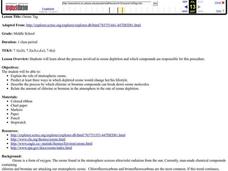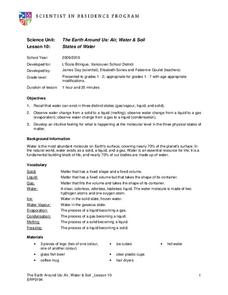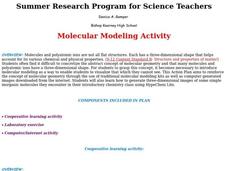Curated OER
Chemistry of Life Study Guide
Biology learners should understand a few chemistry basics. Here is a worksheet that introduces them to the concepts of chemical reactions, molecular bonding, and the unique combination of properties that make water vital to life....
Curated OER
Molar Mass
Only three slides comprise this collection. The first defines molecular weight and molar mass. The second lists the molar mass and number of particles in a mole of several substances. The third is a chart depicting a chemical reaction...
Curated OER
Chapter 6 - Bonds
Although there are only 16 questions here, this chemistry handout makes a terrific unit assessment. It queries youngsters on the properties of ionic and covalent compounds, relates bond length tho stability and enrgy, compares polar and...
Curated OER
Ozone Tag
Seventh graders explain the role of stratospheric ozone and predict at least three ways in which depleted ozone would change her/his lifestyle. They then describe the process by which chlorine or bromine compounds can break down ozone...
Curated OER
Covalent Bonding - Electron Dot Structures
A short paragraph helps explain how covalent bonds are formed, and then your class will complete the Electron/Dot and Structural diagrams for the molecules given. The valence diagrams will reinforce understanding. This activity...
Curated OER
Putting the Ice in Hockey
Eighth grade physical science classes examine why the ice on which hockey is played is slippery. They do so by discussing phases of matter and the molecular motion in each. They read an article on a website and write out answers to...
Curated OER
The Chemistry of Life
In this molecule worksheet, students will use a diagram of a water molecule to see how many electrons and protons the molecule has and use a glycerol molecule diagram to discover carbon atom bonds. 5 fill-in-the-blank questions.
PBS
NOVA Elements
It's like a periodic table variety show! When the plethora of periodic table apps becomes ho-hum, this one may revive interest.
Curated OER
Ionic and Covalent Bonds
Ionic and covalent bonds are the focus of this chemistry activity, which provides students with eighteen key terms to use in a fill-in-the-blank activity. Additionally, students are prompted to write the number of atoms in four given...
Curated OER
Matter And Its Changes
Fifth graders explore the phases of matter, make observations of matter, the physical and chemical properties of matter, solutions and mixtures, formation of molecules and atoms and molecules all through hands on activities.
Curated OER
Doing Science: Computer Models
In this computer models worksheet, students read information about how scientists use computer models to advance the work of science. Students also answer a critical thinking question comparing computer simulations to direct observations.
Curated OER
Different Minerals
In this minerals worksheet, students read about the relationship between elements, rocks and minerals. They experiment using 6 different colored gumdrops to represent 6 common elements. Students construct gumdrop and toothpick models of...
Curated OER
States of Water
Students investigate the 3 states of matter. In this physical science "matter" instructional activity, students observe and participate in a number of demonstrations involving melting and freezing water. Students observe the effect heat...
Curated OER
Laboratory: Modeling Molecular Shapes
In this molecules worksheet, students answer post lab questions about types of bonds, factors that determine polarity and molecular geometry. They calculate electronegativity differences in atoms and determine the types of bonds between...
Curated OER
Molecular Mass
For this molecular mass worksheet, students use factor labeling to convert moles to grams or moles to atoms. Students calculate molecular mass. This worksheet has 6 problems to solve.
Curated OER
Energy Levels and Electron Configurations
Twelfth graders investigate the proper filling order of electrons in the energy levels of an atom. They practice how to "read" these occupied energy levels as electron configurations and demonstrate their understanding through creative...
Concord Consortium
What Is a Chemical Reaction?
Take your class inside a beaker for an up-close view of a chemical reaction! Junior chemists examine how chemical reactions occur using an interactive resource. The activity allows users to change the temperature and observe how it...
Concord Consortium
Temperature and Reaction Rate
Does increasing temperature increase the rate of a chemical reaction? Junior chemists examine the effects of temperature on reaction rate using an engaging interactive. Pupils select the temperature of the reaction vessel, then observe...
Concord Consortium
Catalysis
Get ready to kick things up a notch! Young scientists explore the effects of catalysts using a fun interactive. Learners start the reaction without using a catalyst, then add one over time to examine its effects on reaction rate.
Beyond Benign
Cookie Equations
Cookies and chemical equations have a lot in common! Using cookies as a reference, scholars learn to balance chemical equations. Pieces of the cookies represent different parts of the compounds and elements. This is the sixth installment...
Curated OER
Science Puzzle
In this science worksheet, students identify and locate vocabulary words related to various sciences. There are 20 words located in the word search.
Curated OER
Doing Lewis Dot Diagrams
Students observe the periodic table and draw the Lewis Dot Diagram. In this investigative lesson students construct information on several elements including the Lewis Dot Formation and take a quiz on the information they...
Curated OER
Mole Relationships
In this moles worksheet, students complete 93 word problems in they calculate the moles, volume, or mass of different molecules.
Curated OER
Molecular Modeling Activity
Students work together to explain the VSEPR theory and how it relates to molecules. They name electron pairs that can surround the central atom of an organism. They discuss the factors that determine the polarity of a molecule as well.

























